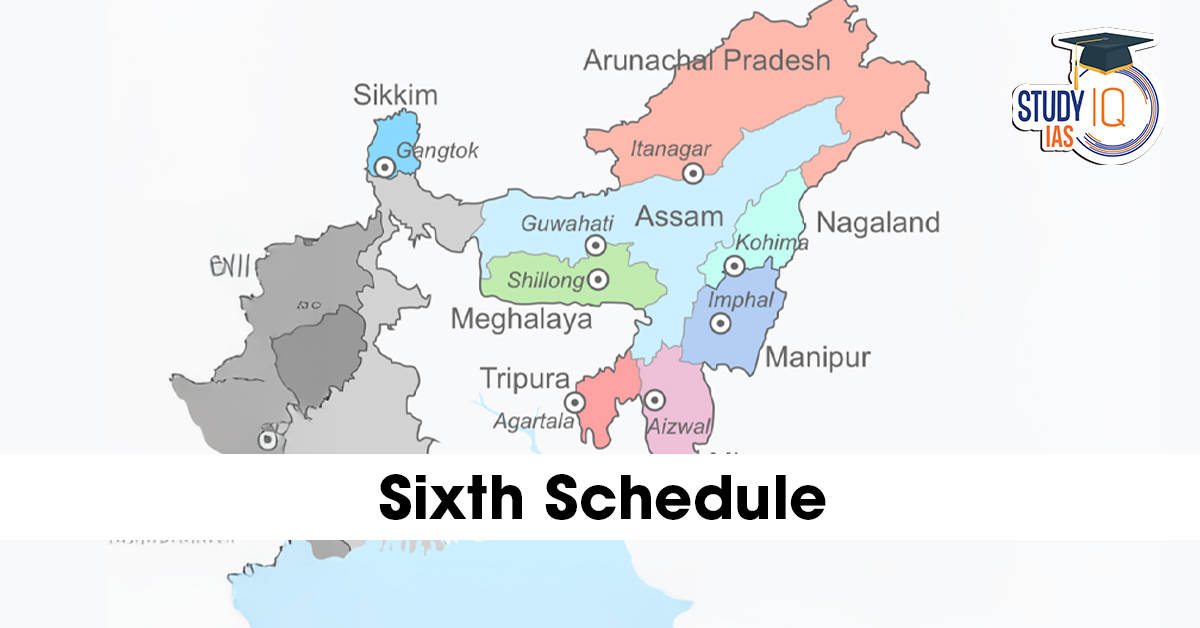Table of Contents
Context: Sonam Wangchuk and other leaders joined a hunger strike in Kargil demanding Ladakh’s statehood and its inclusion in the Sixth Schedule of the Constitution.
Provisions of the Sixth Schedule of Indian Constitution
- Article 244(2): Applies to the administration of tribal areas in Assam, Meghalaya, Tripura, and Mizoram.
- Autonomous Districts & Regions:
- Tribal areas are designated as Autonomous Districts.
- If multiple Scheduled Tribes live in a district, the Governor can create Autonomous Regions.
- Governors can organise, reorganise, alter boundaries, or rename districts.
- District & Regional Councils:
- District Council: Max 30 members (4 nominated by the Governor, rest elected through adult suffrage).
- Regional Council: For each autonomous region.
- Law-making powers:
- Can legislate on land, forests (except reserved), property inheritance, money-lending, and trade by non-tribals.
- All laws need the Governor’s assent.
- Judicial powers:
- Can set up Village & District Council Courts for cases where all parties are Scheduled Tribes.
- Cannot try cases with punishments of death or 5+ years imprisonment.
- Revenue & Taxation:
- Can assess land revenue, impose taxes on trades, animals, vehicles, etc.
- Can grant mining licenses and leases.
- Development powers:
- Can manage schools, dispensaries, markets, fisheries, roads, transport, and waterways.
- Applicability of laws:
- Parliamentary/State laws apply with modifications or exceptions.
- Governor’s oversight:
- Can appoint a commission to review district/region administration.
Benefits of the Sixth Schedule of the Constitution
- Protection of Tribal Rights & Identity:
- Safeguards the land, culture, and traditions of tribal communities from external exploitation.
- Local Self-Governance:
- Empowers Autonomous Districts and Regional Councils to legislate on local matters, ensuring governance is tailored to community needs.
- Cultural Preservation:
- Helps preserve indigenous languages, customs, and festivals through local decision-making.
- Control over Natural Resources:
- Allows tribal councils to regulate land use, forests, and minerals, ensuring sustainable use and preventing outsider exploitation.
- Judicial Autonomy:
- Special courts for tribal disputes provide culturally appropriate justice systems.
- Economic Empowerment:
- Councils can levy taxes, manage markets, and grant licenses for resource extraction, generating local revenue.
- Education & Infrastructure Development:
- Powers to establish schools, dispensaries, fisheries, roads, and transport systems enable targeted development.
- Administrative Flexibility:
- Ability to adapt laws and governance structures to local customs and needs rather than rigid state-wide policies.
- Conflict Prevention:
- Giving decision-making power to local bodies reduces tensions between the state and tribal communities.
- Environmental Protection:
- Local control over forests and resources promotes ecological conservation aligned with traditional practices.
Recent Ladakh Demand
- Ladakh’s 97% tribal population meets the criteria for Sixth Schedule inclusion.
- Rapid developmental projects (geothermal, hydropower, hydrogen plants) threaten Ladakh’s fragile ecosystem.
- Inclusion sought to protect the environment and tribal rights.
Check here: Ladakh Statehood Demand in detail!


 Electoral System in India 2026: SIR Upda...
Electoral System in India 2026: SIR Upda...
 SLAPP Suits: Meaning, Examples, Impact o...
SLAPP Suits: Meaning, Examples, Impact o...
 Finance Commission of India, Articles an...
Finance Commission of India, Articles an...

























